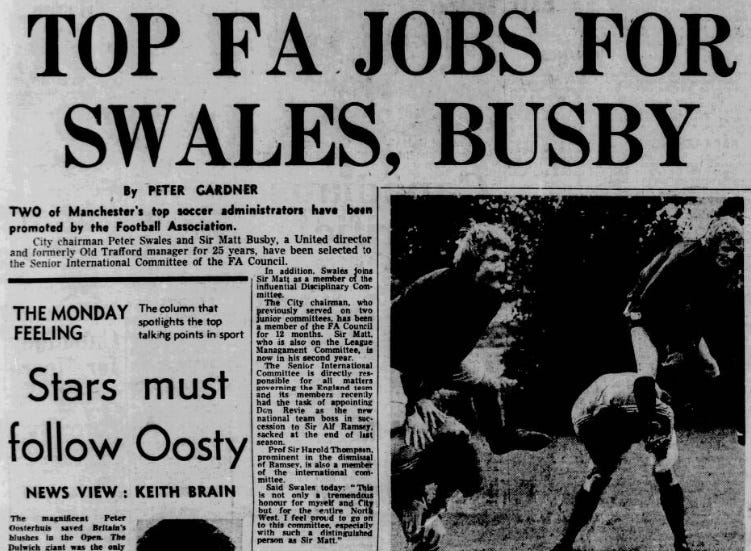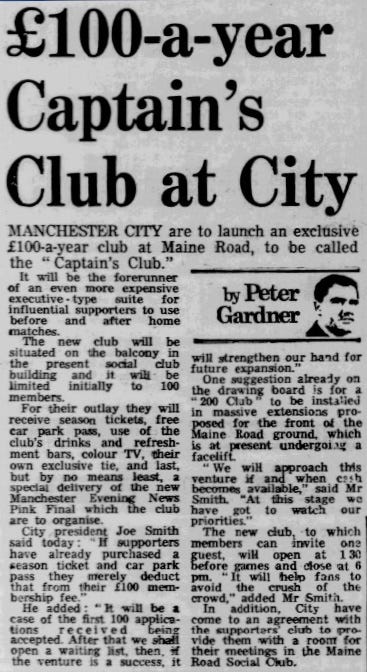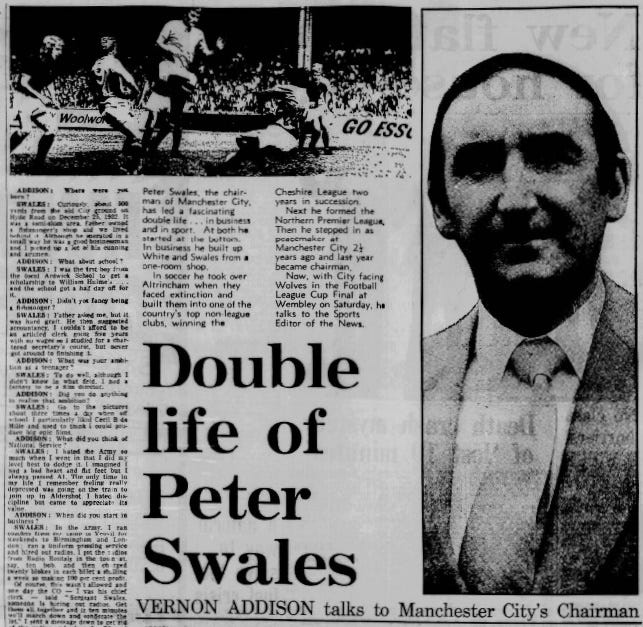The Peter Swales Years (Pt 2)
A Man in a Hurry
In 1974, Peter Swales’ rise in the football world was gathering pace.
In June he was elected to both the Senior International Committee of the FA Council and its Disciplinary Committee.
Earlier that year a miners’ strike had forced the country into the Three-Day Week, an IRA bombing campaign was wreaking havoc, and a General Election had resulted in a hung parliament.
It was an equally turbulent time for English football off the pitch.
Three days before Swales’ appointment, the FA’s Disciplinary Committee had ordered United to fence off both ends of their Old Trafford ground.
On 13 July, the Manchester Evening News reported that ‘9ft-high iron fences, with curved spikes on top, are going up because of fans’ behaviour at the United-City match in April’. The paper revealed that Swales ‘thinks that all clubs will eventually have to protect their pitches with a fence or moat, and City directors will discuss the problem soon.’
Just two months into his new FA role, Swales was fast becoming the ruling body’s spokesman on the future of the game. On 28 August, he told the Manchester Evening News,
“I think the age of the vast ‘kops’ is going to end.
But I think the only long-term solution that is going to work, is to provide all-seating accommodation at grounds.
I think identity cards would bring fantastic problems—but I’m not against trying them out.”
In October, he was the driving force behind a meeting of 16 North-West league clubs held at Maine Road. According to the Liverpool Echo, these turned into regular six-weekly meetings that were ‘designed to ensure that the interests of the North West clubs and their fans are protected’. Although the clubs took turns to host, Swales, along with Sir Matt Busby and Burnley chairman Bob Lord, sat at ‘the top table’.
But it was the actions of players that was concerning club chairmen the most. Calls for freedom of contract were growing, while a month earlier a player revolt at League champions Leeds led to the sacking of Brian Clough after just 44 days in charge.
In November, Swales took the lead in the counter-offensive.
On the eve of a Professional Footballers’ Association meeting in Manchester that would call for freedom of movement, Swales was tasked by the FA with outlining the case against.
Below the story, the Mirror reported that Newcastle striker John Tudor had been hit on the head with a brick that was thrown through the window of the team coach that was returning from Burnley (the brick ‘narrowly missed’ future City manager Frank Clark, the Newcastle captain).
But as the violence and conflict in football raged, Maine Road had become a much happier place.
In the summer, Swales’ main boardroom rival, Joe Smith, had been tasked with introducing corporate hospitality to City.
The ‘Captain’s Club’ was an appropriate name for the new venture. The appointment of Tony Book, who had captained City to four major trophies, as manager on 12 April had transformed the mood at Maine Road.
On Christmas Eve, City were in third place, level on points with leaders Ipswich. In the tightest title race ever seen, only one point separated the top seven clubs. That day City paid £200,000 for 25-year-old Joe Royle, who had scored 119 goals in 276 games for Everton.
Swales said:
‘With 19 games to go we regard this as the last piece in the jigsaw towards our Division 1 championship hopes.’
The summer signing of 23-year-old international Asa Hartford from West Brom for £250,000 had added fresh running to the midfield. In addition, the continued progress of youth team graduates Willie Donachie (23) Tommy Booth (just turned 25), as well as the debut of the prodigiously talented 17-year-old Peter Barnes in October, had given the side a powerful blend of youth and experience.
With peace now restored to the City boardroom, Swales focused on putting the football world to rights. In April he called for three points for a win to be introduced to football, a proposal that wasn’t adopted in England until 1981 (and 1994 for World Cups).
Swales also urged a reform of the FA’s disciplinary process, earning him his Alan Partridge moment from Nottingham’s Football Post. And once again, a Swales prediction proved to be surprising accurate. He told the paper,
“The freedom of contract has got to come because the law is on the players’ side.”
But the 1974-75 season proved to be a disappointing one for City. Royle only managed one goal in 16 league games, while Hartford picked up so many injuries that teammates joked that ‘he had carved his name on the treatment table’.
After two wins and two draws in the final six games City finished in eighth place, seven points off the top. The fact that Francis Lee had been sold to newly-crowned champions Derby the previous summer, and had returned to Maine Road on 28 December to score the winner, did little to lessen the sense of disappointment.
Following the 1-1 draw at Luton on the final day (which, mathematically at least, sealed their relegation) Swales made a ‘motorway dash’ in order to present the trophy at the Wilmslow Albion knock-out tournament.
It was a typical bit of networking for Swales. During the season he had been a guest speaker at Runcorn FC’s and Oldham Athletic’s celebrity dinners, opened Northwich’s social club, judged the Miss Stretford beauty contest, presented prize draws, and performed a Q&A at the Manchester Evening News’ football exhibition. He’d also persuaded England manager Don Revie to be guest of honour at the annual dinner of the Northern Premier League, where Swales was president.
But there was one network he was connected to that he didn’t discuss in the newspapers, one that was now becoming embedded at Maine Road.
In the 1974-75 season City acquired a vice-president. The holder of the newly-created position wasn’t a club director. But he did have long-standing business ties to Swales.
And it was his shadow that would later be cast over Maine Road during its darkest days.
Part 1 of The Peter Swales Years can be viewed here.
On Wednesday I’ll be publishing a story called, How Long Could City’s Dominance Last?
The best way to make sure you don’t miss anything is to subscribe for free below and have stories sent straight to your inbox. Paywalls, like any sort of wall, keep people out. I want very much to keep this work available to everyone but I also need to make a living. If you can, please consider supporting my work with one of the voluntary subscription options.
And because we have ‘istory, City also have a mountain of fantastic photos. Join me on Twitter here where I’ll be posting historic images each day, many that have not been seen before. No angry Twitter rows, just great photos. And maybe the occasional piss-take.







